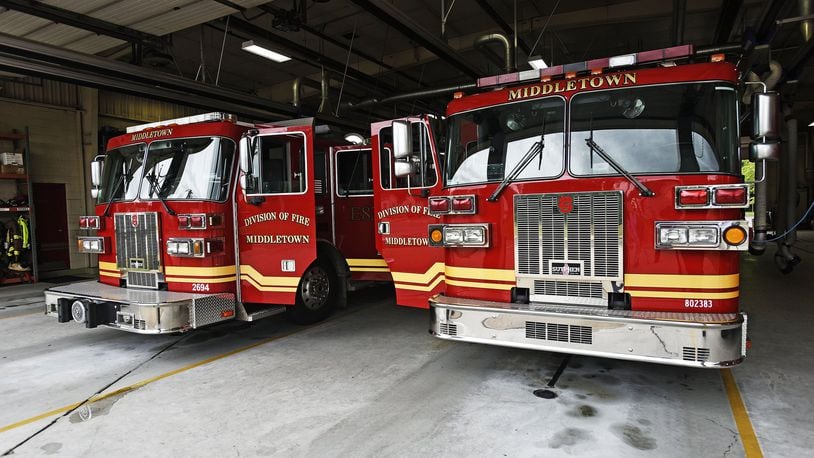City Manager Doug Adkins will offer a presentation at council’s Dec. 6 meeting about reasons for the rate increases. He explained at council’s Nov. 15 meeting he would have offered his explanation then, but he didn’t because the cameras used to record council meetings were being upgraded.
The 2017 general-fund budget will climb by $394,434, or 4.6 percent. Increases will come in the areas of economic development (30.2 percent); information systems (23.2 percent); community revitalization (17.1 percent); law department (7.1 percent); city manager (6.5 percent); public safety (1.3 percent); and finance department (1.1 percent).
Adkins wants to hire an animal-control officer for the first time in about eight years.
The city in 2017 will have 12 more firefighters with help of a $1.8 million federal SAFER grant (Staffing for Adequate Fire and Emergency Response). Those added firefighters will make it possible to get sufficient personnel to the scenes of fires, Fire Chief Paul Lolli has told the Journal-News.
Even if the city in two years does not receive a renewal of the grant from the Department of Homeland Security, Middletown already has negotiated with the International Association of Fire Fighters Local 336 to lower pay classifications for those with certifications of firefighter/EMT, as opposed to firefighter/paramedic.
Middletown now has 60 firefighters on the streets, with the other five in the administrative staff. The additional firefighters will give the city 72 firefighters on the streets.
When the federal grant is counted, the fire service’s spending plan is increasing by 9.9 percent over 2016, Adkins said.
Part of the plan for next year is to start an “automatic-aid” fire agreement with Monroe, Adkins told city council. That agreement, “even though it is taking a long time, is going really well,” Adkins said. “We are in the process now where we’re trading services regularly to help each other out.”
“What we’re trying to do is as we do this over several months, evaluate where we tripped up, before we put something in writing,” detailing how an agreement would operate, “and work out some of those bugs,” he said.
The city also will work on a five-year strategic plan that will analyze where fire stations should be located.
“The one thing we know is as the city grew towards the highway, our fire stations, which were built 30-, 40-, 50 years ago, are not best positioned to be able to give everybody the fastest service,” he said. “We’re going to look at where they ideally would be, and then start talking about how we would start repositioning our fire-department stations (in) 2018-2020.”
With police staffing, the biggest change in 2017 will be the transfer of people from uniformed-patrol and the jail management into a task force “that does nothing but goes out and targets hot spots in crime, and the chronic-nuisance ordinance,” Adkins has told the council. “Every week, all they (will) do is go out and do community policing efforts and enforce the chronic-nuisance ordinance to start knocking down places where crime is happening in our community.”
The jail has had an officer assigned there. That officer will be reassigned to the street, Adkins said.
Among the major budget factors are:
- A 1.5 percent cost-of-living increase to all employees in 2017, with no performance-based incentives;
- An expected 3.2 increase in income-tax revenues; and
- An anticipated 5.8 percent increase in health-insurance costs in 2017 for city employees.
Middletown sewer, trash rates climbing
Effective Jan. 1, Middletown’s sewer rates will climb 15 percent, following a November decision by the city council. The trash fee also will rise the same day.
The typical residential sewer bill is $28.15 per month, based on use of 600 cubic feet of water, and that would rise about $4.22 monthly. In January, City Manager Doug Adkins predicted other 15-percent increases would be needed each year from 2018-2020, followed by a 12 percent hike in 2021 and a 7 percent climb in 2022. He later said those were merely estimates.
Part of the reason is overflows from Middletown sewers that handle both raw sewage and storm water. The cost of preventing such overflows “is $120 million over the next 30 years,” according to a report city administrators provided to the council. Also, “nearly half of the city’s sewer system is 50 years old or older and will require extensive rehabilitation going forward (at an estimated $142 million over the next 30-40 years).”
According to a survey of municipal sewer costs in 63 area jurisdictions that was conducted earlier this year by the city of Oakwood, Middletown now ranks 30th highest among the 63. The increase will put Middletown at 16th highest.
With trash rates, which will climb to $15 from $14.25 per month on Jan. 1, the increase is necessary because environmental regulators are requiring additional methane monitoring at the city’s landfill, City Manager Doug Adkins has said. Also, costs of the city’s three-year trash-collection contract with Rumpke increase by 2.1 percent in 2017. The contract has options for increases of 2.6 percent per year in 2018 and 2019.
About the Author
